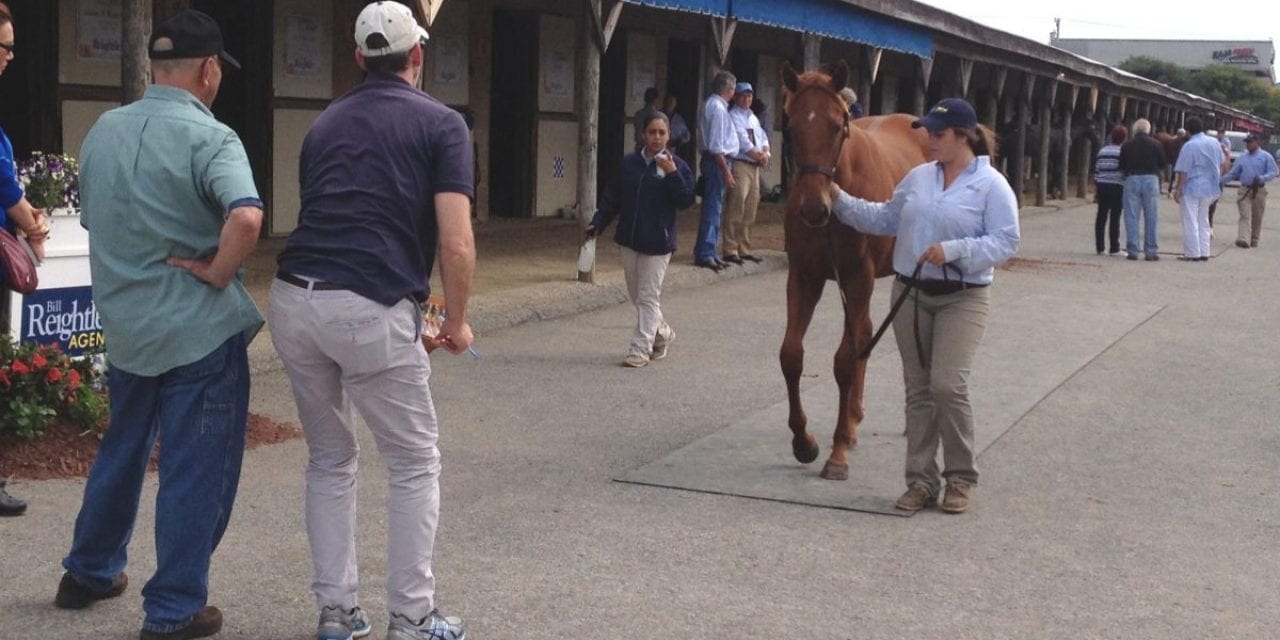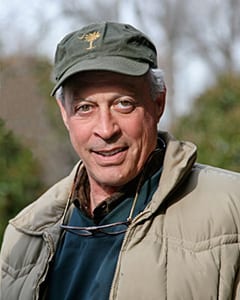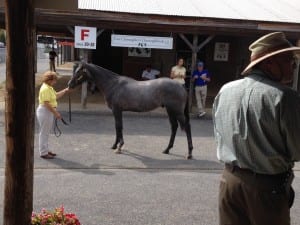A Sponsored Story
“You have to have a routine and a program you know will produce a good, well-educated horse,” Kip Elser says. “But like every good school that has a good lesson plan, you also have to provide individualized help to get there.”
Elser, who operates Kirkwood Stables in Camden, SC, should know. He’s been turning gawky yearlings into two-year-old sale-toppers and top racers for more than three decades. He’ll be at Monday’s Fasig-Tipton Eastern Fall Yearlings Sale looking for the next generation of stars.
Kirkwood-prepped horses have led sales at Keeneland, Barretts, Calder — even at Tattersalls in Great Britain. And they’ve won major races across the country, including three runnings of the Grade 1 Kentucky Oaks.
In 2014’s round of two-year-old sales, Kirkwood consigned a half-dozen six-figure horses, among them a $300,000 daughter of Tapit and a $255,000 Flatter filly.
The trick, Elser says, is identifying the right horses and putting them in the right program.
“It’s really fun picking out young horses, and it’s really fun developing them,” he says. “I love trying to see the common denominators that most good horses share. It’s all angles and shapes; it’s propulsion and shock absorption.”
Of course, most of us look at a spindly-legged yearling and see, well, a brown horse with spindly legs. Elser, on the other hand, sees what that youngster might become.
Back in 2009, for example, he ended up with a pair of fillies in his care: “a big, tall, awkward filly by El Prado” and another “big, awkward” filly, this one a Pennsylvania-bred daughter of Medaglia d’Oro.
Yet he says he had high hopes for both, and it’s safe to say that both lived up to those expectations — and then some.
Winter Memories, that awkward daughter of El Prado, went on to win nearly $1.3 million, finishing her career with a win in the Grade 1 Diana Stakes at Saratoga.
And Plum Pretty, prepped by Elser for the Ocala Breeders Sale March two-year-old sale, fetched $130,000 at the sale — and then went on to win nearly $1.7 million, including the Kentucky Oaks.
Not a bad year at the training center.
It is, typically, a four- to six-month program, Elser says, aimed at building a sound, smart horse who can thrive in the hurly-burly of the sales world and at the racetrack. About 75 days into a horse’s stay, Elser and his staff begin to have an idea of which sales will fit which horses best.
The horses projected to be sold and those heading to the track follow the same basic program, Elser says, until several weeks before a targeted sale. Then, the horses that will be sold stop breezing in company and begin to breeze on their own, to prepare them for what they will be required to do at the sales grounds.
Yet though the horses follow the same basic program, Elser, who will usually have about 75 on hand during peak season, allows for plenty of individual attention, too. So, for example, a big strapping colt might get extra work; a light, racy filly might do best under a lighter work load. One horse might need more time in the paddock, while another wants less.
Plum Pretty amply demonstrates the value of the Kirkwood program. After she’d failed to meet her reserve at both Fasig-Tipton’s Saratoga Selected Yearlings sale and their Eastern Fall Yearlings sales, bloodstock agent Mark Reid of Walnut Green sent her to Kirkwood to prep for the two-year-old sales.
“I had loved her at Saratoga,” Elser says. “I was very glad that [Reid] had bought her back and sent her to me. I thought she would be a much better filly as a two year old after she got some miles under her belt.”
Though he says that the filly “never really came all the way to hand for me,” he points out that he and John Fort, who bought her, saw the same potential in her.
That she trained side-by-side with Winter Memories was simple happenstance. The latter filly had come in as part of the typical group of youngsters that Elser prepares for his longtime clients, Darby Dan Farm.
“They trained together — not for any big reason, just because they did,” Elser recalls. “And it’s one of those things, in doing all the early stuff they were absolutely even up, looked each other in the eye, did everything exactly the same way. They were a matched pair everything they did.”
They even, as fate would have it, broke their maidens less than two months apart in 2010 and concluded their racing careers within three months of each other in 2012. In between, each won a pair of Grade 1 events.
“The statistics tell you that maybe seven or eight percent become successful racehorses,” Elser says. “We have a plan here that we think we can do two or perhaps three times that.”
Part of that is the Kirkwood program.
Another part is the facility itself. Kirkwood operates out of the Springdale Training Center at the Springdale Race Course in Camden. Built by Marion duPont Scott in the 1930s, the facility includes a pair of dirt tracks, one five-eighths of a mile and the other about a mile with an uphill finish. It also has a variety of turf configurations available. That lets Elser vary his training routines and train horses on the two surfaces they’re most likely to see once they reach the track; that’s good for both mind and body.
And part of it is being honest with owners. Not every horse is cut out to be a racehorse, and the sooner an owner knows that, the better.
“If I don’t think they’ll do, I’m not shy in telling a guy it’s not in his best interest to keep persevering,” Elser says. “They don’t need to spend the money, and I don’t need the practice.”
Still, that’s not what gets a horseman up in the morning. Good horses do.
“I love looking at horses,” Elser says. “I love watching good horses.”
And when they go on to be successful?
Elser smiles. “It’s like you’re the college coach that had your kid get drafted, and he goes on to be an all-star in the NFL.”
Learn more about Kirkwood Stables, or contact Kip, at www.kirkwoodstables.com.









